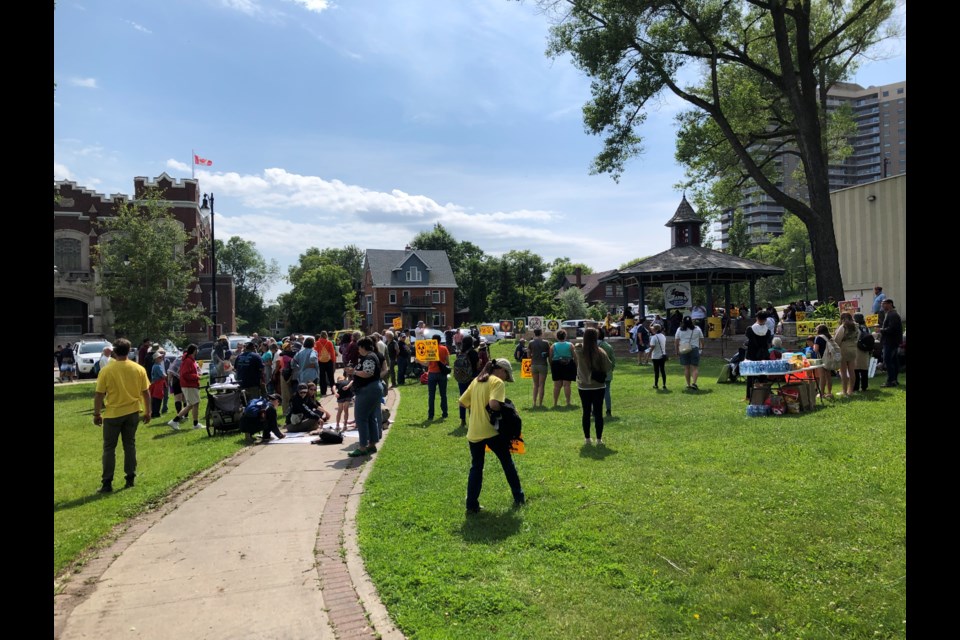THUNDER BAY — Representatives from a number of area First Nations joined other like-minded groups in their continued opposition to plans to store spent nuclear fuel in Northwestern Ontario.
The latest rally against the proposed deep geological repository took place in Waverley Park late Friday afternoon under sunny skies, after most of a day’s worth of rain and stormy weather cleared out. It was organized in partnership between Grassy Narrows First Nation (Asubpeeschoseewagong) and Fort William First Nation.
“One voice alone is not enough to put a stop to nuclear waste coming through our communities and nuclear waste entering our waterways, but it's our collective effort (that) can certainly make an impact,” Fort William Chief Michele Solomon said in her opening remarks to the assembled crowd.
“We're able to come together collectively and bring a strong voice to this issue of saying no to nuclear waste that threatens our life, threatens our water, threatens the animals, threatens the Earth, threatens our children, threatens our very existence.”
Friday's rally drew about 400 people, organizers said in a media release issued after the event.
The Nuclear Waste Management Organization, who has been leading a years-long process to find a site it says is suitable for the spent fuel from the country’s nuclear power plants, announced in November 2024 it chose Revell Lake — located between Ignace and Wabigoon Lake Ojibway Nation — for its proposed deep geological repository.
The facility would be built 650 to 800 metres below ground, says the NWMO, and would consist of multiple rooms to store the used fuel. It has estimated construction could begin in 2033, with operations to start by 2045, should it pass regulatory and licensing reviews.
The government mandated and indutry funded organization has consistently said the project is safe.
Representatives from First Nations around the region, including Grassy Narrows, have spoken and rallied at similar events opposing the storage facility being built in the Northwest citing, among things, their concerns about the transportation of the material to the region, and what the long-term ramifications are of burying it deep underground, where it would remain for hundreds of thousands of years.
Solomon has previously expressed her displeasure with the NWMO’s decision.
Chrissy Isaacs, a mother and grandmother from Grassy Narrows who has a long history of advocacy for her community as it continues to deal with the multi-generational impacts of mercury poisoning, said she doesn’t want to see any type of similar environmental disaster.
“Our community already suffers with mercury poisoning, and I see it every day, how it affects our people,” she said in an interview. “If nuclear waste seeps into the river … it's going to be even more devastating for my community.”
“But, also, for the land and the water — all in this whole area — that's what's at stake for everybody, not just Anishinaabe people, but for all people that live in this area.”
Darlene Necan was in Thunder Bay for the rally from her home community of the Ojibway Nation of Saugeen, located about 130 kilometres northeast of Ignace. She has previously organized walks opposing the nuclear repository.
Necan told Newswatch it’s heartening to see more people paying attention, citing, not only the turnout to Friday’s rally, but also to a screening of The Moth, a locally-produced short movie shown the evening before, and which touches on numerous environmental issues, including nuclear waste.
“It's slowly growing from what I'm seeing,” Necan said. “Yesterday kind of blew me away when we went to the filming and there was a lot of people in there.”
“I'm hopefully kind of observing that it's right, that it is growing, and I hope more and more people got their ears perked up.”
Nishnawbe Aski Nation Grand Chief Alvin Fiddler, current Neskantaga Chief Gary Quisess, former Chief Chris Moonias and former Grassy Narrows Chief Rudy Turtle were also scheduled to speak. In a media release, organizers said labour leaders, environmentalists and faith groups would also attend.
After the speeches at Waverley Park, organizers said everyone would walk to the spirit garden on the city’s north-side waterfront.
Isaacs said she hopes the momentum continues.
“I think that everybody should be waking up and, you know, putting a stop to stuff like this.”
